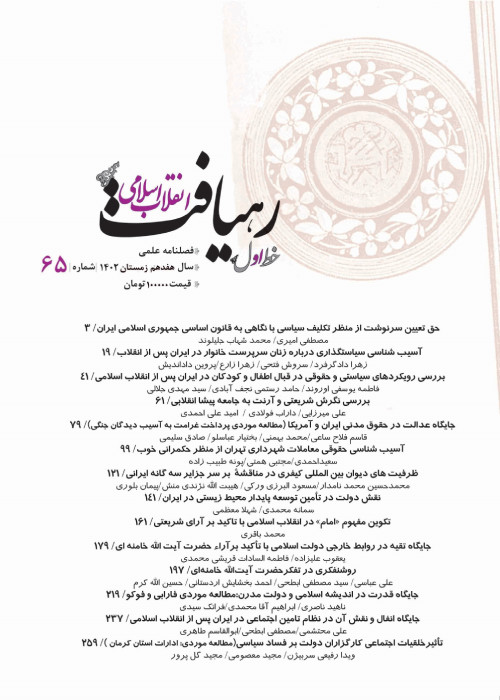فهرست مطالب
فصلنامه رهیافت انقلاب اسلامی
پیاپی 14 (بهار 1390)
- تاریخ انتشار: 1390/04/04
- تعداد عناوین: 8
-
صفحه 144
-
Page 3
The Islamic movements, including those by the Sunnis and the Shiis were initiated, during the past centuries, to confront the colonialists and to revive Islam and the Islamic civilization. These movements emphasize over returning to the Islamic values and the revival of true Islam as the only way out of the occurring crises. The purpose of this study is to identify the similarities and differences among these movements with respect to their approach in dealing with the current crises in the Islamic world, as well as to conduct a comparative analysis between their theoretical and practical standpoints considering the intellectual principles and practical approaches of their religions (whether Sunni or Shii), in the process of confronting the problems and the principle of returning to Islam and reviving its values and implementing the Islamic law, which is a principle common to these movements. Using a descriptive-comparative approach, this study endeavors to support the hypothesis that despite the fact that both religions and Islamic movements (Shii and Sunni) face common crises and are going through a similar path in their search for the realization of common goals such as the implementation of Islamic law, the establishment of Islamic government, fighting against westernization and returning to the principle of true Islam in order to confront the current crises of the Islamic world, they have a similar intellectual orientation. However, there are major differences in their intellectual principles and practical strategies with respect to the method of implementing the Islamic law and establishing Islamic government.
-
Page 51The present article is an attempt to reveal that Bahai sect today is an independent political-official union and is used by imperialists as a threat to Muslims. Bahaism was initially just a religious sect but in the process of its formation and growth, it called attention of foreign countries. Although Bahai sect claims to be a universal, apolitical and autonomous religion, the considerable distance between action and words denies this claim. This paper, based upon a documentary and historical research, tries to illustrate how the relations with imperialists, interference in various political affairs and possessing an independent and united system, has turned this sect into a political one which is at the hands of political goals of the foreign countries.
-
Page 91By the end of the Cold War and the end of the twentieth century, a new trend had been established in the world on the basis of the US being the great power, based upon which international rules were set. The “11 September” event like “Pearl Harbor” played a significant role in the foreign policy of the United States. The United States failing the crisis management after 11 September event couldn’t maintain its hegemonic stand on the one hand and with the emergence of economic crisis, the US lost its control over the situation which led to disturbing the hegemony of the US on the other. Under these circumstances, the US is facing legitimation crisis, so it is making a strenuous effort to repair its international image. America’s approach since Bush’s government was using hard power in gaining legitimation in the international arena; however this approach failed during these 8 years and with Obama coming to power, power was viewed from a different perspective. Today America using soft power is striving for making new allies all over the world, because by the advent of new powers, a modern trend in the international environment is being established.
-
Page 125Magnificence, dissemination and comprehensiveness of the Islamic Revolution led to considerable evolutions in different cultural, social, political and economic layers of Iran’s society. As a result of these dramatic changes, literature which is quite interwoven with social phenomena has experienced a basic change. From the perspective of literary sociology, great political and social changes_ as Islamic Revolution of Iran_ deeply affect literature, art and other cultural phenomena. Although these effects are usually seen in deep structure and the kind of discourse dominating the text, they include linguistic forms and figurative speech as well. Literature generally and poetry specifically played a significant role in enhancement and development of the goals and ideals of the Islamic Revolution. Committed poets are among those who in this age of resisting against oppression have emphasized over the sense of hopefulness and the admiration of heroes in their poetry and have taken part in the Islamic movements.


